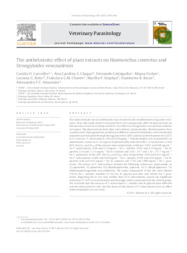The anthelmintic effect of plant extracts on Haemonchus contortus and Strongyloides venezuelensis.
The anthelmintic effect of plant extracts on Haemonchus contortus and Strongyloides venezuelensis.
Author(s): CARVALHO, C. O.; CHAGAS, A. C. de S.; COTINGUIBA, F.; FURLAN, M.; BRITO, L. G.; CHAVES, F. C. M.; STEPHAN, M. P.; BIZZO, H. R.; AMARANTE, A. F. T.
Summary: The indiscriminate use of anthelmintics has resulted in the establishment of parasite resistance. Thus, this study aimed to evaluate the in vitro antiparasitic effect of plant extracts on Haemonchus contortus in sheep and the in vivo effect on Strongyloides venezuelensis in Rattus norvegicus. The plant extracts from Piper tuberculatum, Lippia sidoides, Mentha piperita, Hura crepitans and Carapa guianensis, produced at different research institutions, were chemically analyzed and evaluated through the egg hatch test (EHT) and larval development test (LDT) in H. contortus. P. tuberculatum (150 and 250 mg kg−1 of body weight) was evaluated for its anthelmintic action on R. norvegicus experimentally infected with S. venezuelensis. In the EHT, the LC50 and LC90 of the extracts were respectively as follows: 0.031 and 0.09 mg mL−1 for P. tuberculatum, 0.04 and 0.13 mg mL−1 for L. sidoides, 0.037 and 0.10 mg mL−1 for M. piperita, 2.16 and 17.13 mg mL−1 for H. crepitans and 2.03 × 10−6 and 1.22 × 10−12 mg mL−1 for C. guianensis. In the LDT, the LC50 and LC90 were respectively: 0.02 and 0.031 mg mL−1 for P. tuberculatum, 0.002 and 0.04 mg mL−1 for L. sidoides, 0.018 and 0.03 mg mL−1 for M. piperita, 0.36 and 0.91 mg mL−1 for H. crepitans and 17.65 and 1890 mg mL−1 for C. guianensis. The extract of P. tuberculatum showed the following substances: piperamides as (Z)-piplartine, (E)-piplartine, 8,9-dihydropiplartine, piperine, 10,11-dihydropiperine, 5,6 hihydropiperlongumine and pellitorine. The major compounds of the oils were thymol (76.6%) for L. sidoides, menthol (27.5%) for M. piperita and oleic acid (46.8%) for C. guianensis. Regarding the in vivo test, neither dose of P. tuberculatum caused any significant reduction (P > 0.05) in worm burden and fecal egg counts compared with the control group. We conclude that the extracts of P. tuberculatum, L. sidoides and M. piperita have effective activity when tested in vitro, but the doses of the extract of P. tuberculatum have no effect when employed in in vivo tests.
Publication year: 2012
Types of publication: Journal article
Observation
Some of Embrapa's publications are published as ePub files. To read them, use or download one of the following free software options to your computer or mobile device. Android: Google Play Books; IOS: iBooks; Windows and Linux: Calibre.
Access other publications
Access the Agricultural Research Database (BDPA) to consult Embrapa's full library collection and records.
Visit Embrapa Bookstore to purchase books and other publications sold by Embrapa.

